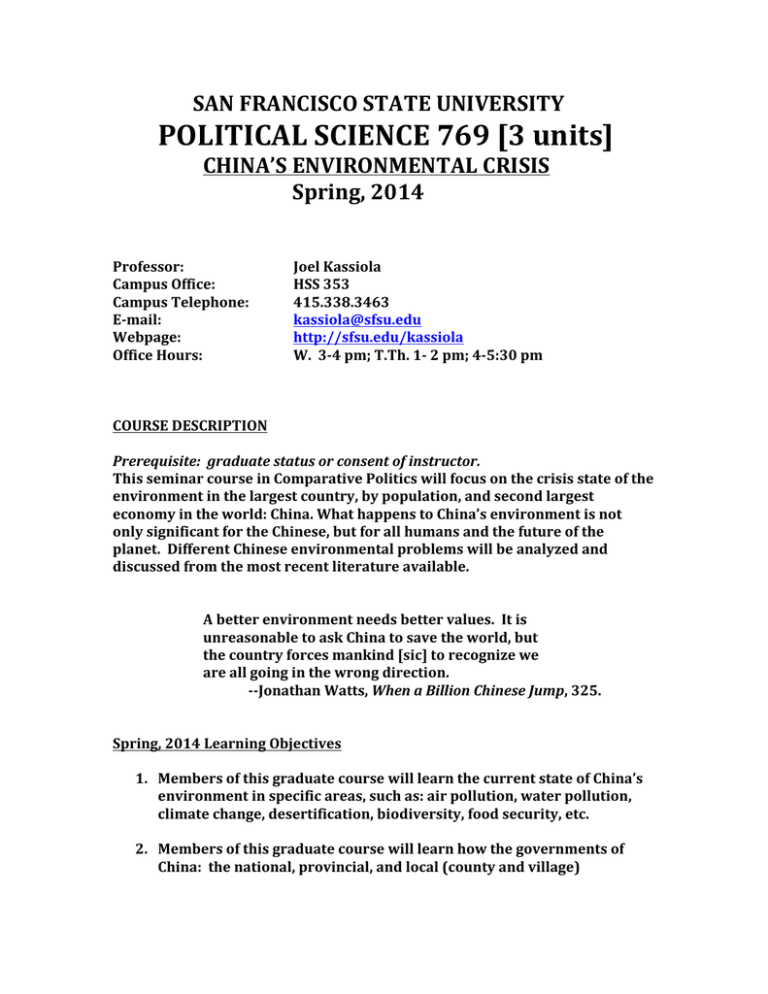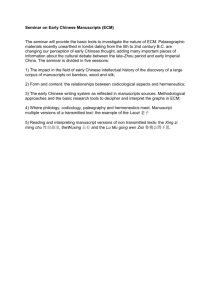Document 10882907
advertisement

SAN FRANCISCO STATE UNIVERSITY POLITICAL SCIENCE 769 [3 units] CHINA’S ENVIRONMENTAL CRISIS Spring, 2014 Professor: Joel Kassiola Campus Office: HSS 353 Campus Telephone: 415.338.3463 E-­‐mail: kassiola@sfsu.edu Webpage: http://sfsu.edu/kassiola Office Hours: W. 3-­‐4 pm; T.Th. 1-­‐ 2 pm; 4-­‐5:30 pm COURSE DESCRIPTION Prerequisite: graduate status or consent of instructor. This seminar course in Comparative Politics will focus on the crisis state of the environment in the largest country, by population, and second largest economy in the world: China. What happens to China’s environment is not only significant for the Chinese, but for all humans and the future of the planet. Different Chinese environmental problems will be analyzed and discussed from the most recent literature available. A better environment needs better values. It is unreasonable to ask China to save the world, but the country forces mankind [sic] to recognize we are all going in the wrong direction. -­‐-­‐Jonathan Watts, When a Billion Chinese Jump, 325. Spring, 2014 Learning Objectives 1. Members of this graduate course will learn the current state of China’s environment in specific areas, such as: air pollution, water pollution, climate change, desertification, biodiversity, food security, etc. 2. Members of this graduate course will learn how the governments of China: the national, provincial, and local (county and village) 2 governments are responding to their environmental challenges with environmental policies and management decisions. 3. Members of this graduate course will learn about the birth and growth of the nongovernmental environmental movement in China and its unique regulations and restrictions within China’s political system. 4. Members of this graduate course will learn about the tension between economic development and environmental protection in emerging market societies like China. 5. Members of this graduate course will learn how the Chinese consumer revolution impacts China’s citizens, the world’s population, and the global environment. 6. Members of this graduate course will learn about theorizing on the future prospects for China’s and the world’s environment, as well as on its political system and the world’s globalized neoliberal political values. Required Readings: Gerth, Karl. As China Goes, So Goes the World: How Chinese Consumers are Transforming Everything. New York: Hill and Wang, 2010. pb. Kassiola, Joel Jay and Sujian Guo, eds. China’s Environmental Crisis: Domestic and Global Political Impacts and Responses. New York: Palgrave Macmillan, 2010. hb. Mertha, Andrew C. China’s Water Warriors: Citizen Action and Policy Change. Ithaca: Cornell University Press, 2010. pb. Shapiro, Judith. China’s Environmental Challenges. Cambridge, UK: Polity Press, 2012. pb. Watts, Jonathan. When a Billion Chinese Jump: How China Will Save Mankind -­‐-­‐Or Destroy It. New York: Scribner, 2010. pb. Topics and Readings: Week 1: January 29, 2014 Introduction of members of the Seminar and Instructor; also topic. Please read: Shapiro: China’s Environmental Crisis, Introduction: The Big Picture, 1-­‐32. 3 Week 2: February 5, 2014 Background to the environmental conditions in contemporary China, region by region: Beijing, Southwest and Southeast. Please read: Watts: When a Billion Chinese Jump, Introduction, Chapters 1-­‐8, ix-­‐148. Week 3: February 12, 2014 Background to the environmental conditions in contemporary China, region by region, continued: Northwest and Northeast. Please read: Watts, When a Billion Chinese Jump, Chapters 9-­‐Afterword, 151-­‐326. Week 4: February 19, 2014 China’s environmental challenges from the state-­‐level above. Please read: Shapiro, China’s Environmental Challenges, Chapters 2-­‐4, 33-­‐102. Week 5: February 26, 2014 China’s environmental challenges from the public below and future prospects. Please read: Shapiro, China’s Environmental Challenges, Chapters 5-­‐7, 103-­‐181. Week 6: March 5, 2014 China’s “hydraulic society” and its challenges. Please read: Mertha, China’s Water Warriors, Preface, Chapters 1-­‐3, xiii-­‐ 93. Week 7: March 12, 2014 China’s political system’s response to water issues. Please read: Mertha, China’s Water Warriors, Chapters 4-­‐6, 94-­‐162. 4 Week 8: March 19, 2014 China’s current environmental conditions and public policies regarding: desertification and biodiversity. Please read: Kassiola and Guo: China’s Environmental Crisis, Introduction and Jiang, and Jordan contributions: 1-­‐59. Week 9: March 26, 2014 SPRING BREAK; no class. Week 10: April 2, 2014 China’s policies regarding climate change and food security. Please read: Kassiola and Guo: China’s Environmental Crisis, Liang, and McBeath and McBeath contributions: 61-­‐119. Week 11: April 9, 2014 China’s Environmental Non-­‐Governmental Organizations (ENGOs) and environmentally-­‐inspired public protests. Please read: Kassiola and Guo, China’s Environmental Crisis, Alpermann, Harris and, Yu and Zeng contributions: 123-­‐193. Week 12: April 16, 2014 China’s environmental crisis and Confucianism: Is a Confucian green theory desirable? feasible? Please read: Kassiola and Guo: China’s Environmental Crisis, Kassiola contribution, 195-­‐218. Also: Joel J. Kassiola, “China’s Environmental Crisis and Confucianism: Proposing a Confucian Green Theory to Save the Environment,” to be published in December, 2013 in a forthcoming volume on China’s environmental management system [to be distributed]. Week 13: April 23, 2014 Chinese consumption and its—and the world’s—environmental crisis. Please read: Gerth, As China Goes, So Goes the World, Introduction, Chapters 1-­‐3, 3-­‐90. 5 Week 14: April 30, 2014 Chinese consumer society and branding obsession. Please read: Gerth, As China Goes, So Goes the World, Chapters 4-­‐6, 91-­‐156. Week 15: May 7, 2014 The commodification of everything in China and its environmental consequences. Please read: Gerth, As China Goes, So Goes the World, Chapters 7-­‐ Conclusion, 157-­‐205. Week 16: May14, 2014 Wrap-­‐up discussion and preparation for the open-­‐book, final exam on: Wednesday, May 21, 2014, 1:30-­‐4:00 pm. Seminar Members’ Responsibilities Each member of the seminar will be expected to co-­‐lead seminar discussions by preparing presentations that will open each class session. These presentations will be accompanied by written analyses of the reading for that session. Other members of the seminar will be expected to bring at least one discussion question based on the weekly readings when they are not making presentations. In addition, brief rationally persuasive essays will be expected for each of the readings on topics chosen by the students. In lieu of a research paper, an open-­‐book final exam will be given whose aim will be to synthesize the semester’s readings and seminar discussions. In addition, seminar members will be expected to contribute to the discussions during seminar meetings as well as to the iLearn Discussion Forum established for this seminar. Thus, attendance is mandatory unless emergency circumstances make it impossible.



